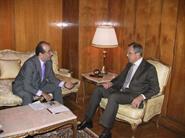Date : 03/03/2019

MOSCOW, March 3 (KUNA) -- The Russian Federation described relations with Kuwait as a "genuine friendship" based on equality, mutual respect and constructive cooperation.
In an interview with KUNA, Russian Foreign Minister Sergey Lavrov said that Kuwait and Russia celebrated the 55th anniversary of establishing bilateral diplomatic ties last year.
"We will not stop at this point, we will work together to move forward to give further dynamism to our relations and move to a new level," Lavrov said.
He praised the results of the visit of His Highness the Amir Sheikh Sabah Al-Ahmad Al-Jaber Al-Sabah to Russia and his talks with Russian President Vladimir Putin in November 2015, saying that the visit showed a huge potential of bilateral cooperation between the two countries.
He stressed the importance of exerting more efforts to cement cooperation, expand the volume of trade exchange, enhance investment cooperation and implement promising joint projects in many fields.
The Russian Minister noted that he will begin a working trip to Qatar, Saudi Arabia, Kuwait and the United Arab Emirates, during the period from March 3 to 7.
He confirmed that the Middle East region occupies a special space in Russian foreign policy, noting that Russia has deep-rooted relations and fruitful cooperation with the countries of this region.
Lavrov stressed his country's commitment to work on building a democratic and multi-polar world, in which people can determine their own economic and social development patterns while preserving their cultural and civilizational identity.
"Russia is building relations with the Gulf states on the basis of mutual respect," he said, adding that strengthening ties would meet long-term interests and promote peace and stability throughout the Middle East.
The Russian Foreign Minister explained that during his Gulf tour, the talks will focus on discussing the prospects of developing bilateral cooperation relations, in light of the agreements reached at the highest levels.
Moreover, Lavrov said that Russia attaches great importance to strengthening coordination with GCC countries in the field of foreign policy, adding that the talks, to be hold during his tour, will also tackle the situation in Syria and the issue of the Palestinian-Israeli settlement.
He added that these committees will hold meetings during this year, noting that the sixth session of the Russian-Kuwaiti joint committee for economic, commercial, scientific and technological cooperation will be held in Kuwait during the talks to be held with the Kuwaiti leadership.
He stressed the importance of the role played by different business events, pointing out to the fourth International "Arabia Expo 2019", and the holding of the 12th session of the Russian-Arab Business Council in Moscow from April 8 to 10.
Lavrov described these events as "a unique opportunity to discuss ways to develop practical cooperation between Russia and the countries of the region in the commercial and economic fields".
Lavrov also underlined the importance of facilitating transport links and simplifying visa procedures between Russia and GCC countries, saying that this would help to promote trade exchange and develop cultural, humanitarian and tourism links.
In response to a question on Syria, the Russian Foreign Minister said that the situation in Syria has stabilized after the successful operations carried out by the Syrian government forces with the support of the Russian Air Force.
He added that the so-called Islamic State (IS) had been eliminated, noting that it is still early to talk about the final elimination of the terrorist threat in Syria.
He said that much more work to be done to eliminate the dormant cells of the radical groups, especially in Idlib, where a large part of which is still under the control of militants from the Sham Liberation Army, which is carrying out provocative operations against the Syrian and Russian civilian and military bodies.
He stressed the need to continue the effective response to terrorism, urging Turkey to implement the Memorandum on Stabilization of the Situation in Idlib signed by Turkey and Russia on 17 September 2018.
He explained that the Russian-Turkish memorandum, which includes the need to establish a buffer zone in Idlib and the elimination of all radical groups, has not yet been fully implemented.
Lavrov noted that the "Astana track" of Syria proved effective, recalling that the decisions made in the framework of Astana, which led to the establishment of reduced-tension areas and create conditions under which refugees can voluntarily return home.
"We are working actively with our Iranian and Turkish partners to implement the resolutions of the Syrian national dialogue conference," Lavrov said, adding that issues of ensuring the stability of the situation in Syria, pushing forward the process of political settlement and launching the work of the constitutional committee were discussed during the summit of the guarantor states (Russia, Iran, Turkey) held in Russia's Sochi on February 14.
Speaking about the Israeli-Palestinian settlement, Lavrov stressed that the solution of the Palestinian issue is an essential element in ensuring stability in the Middle East and North Africa.
He stressed his country's efforts, within the framework of the UN Security Council, to create conditions for continued contacts between Palestinians and Israelis.
Lavrov recalled that in the fall of 2016, President Vladimir Putin had proposed holding a high-level Palestinian-Israeli meeting in Moscow without preconditions.
He reiterated Russia's readiness to welcome the leaders of Palestine and Israel, stressing that direct negotiations would help find a way out of the current impasse.
The Russian official highlighted the unilateral US moves and their negative effects on the Middle East peace process, recalling that US President Donald Trump had promised to do his utmost to achieve an Israeli-Palestinian settlement.
Lavrov stressed the importance of the efforts made by international community to ease the tension in the region, resume the Palestinian-Israeli settlement process based on international legitimacy, and launch direct negotiations between the two parties, noting that Russia regards the Middle East Quartet as a useful framework for achieving this goal. (end)
as.haq